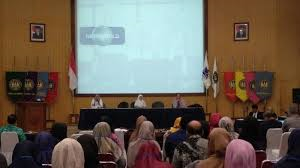You are here
SSEIS 2019 BRINGS EDUCATION AND RESEARCH PRACTICES SHARE THEIR RESEARCH FINDINGS

The Faculty of Mathematics and Natural Sciences Universitas Negeri Yogyakarta held an international conference titled The Science and Science Education International Seminar (SSEIS) at 27-28th of September 2019 in the UNY Rector's courtroom. The theme of the conference is "Promoting Science for Technology & Education Advancement". The keynote speaker at the seminar was Prof. Mahesh Narayan, Ph.D., (Biochemistry, Department of Chemistry, The University of Texas at El Paso, Texas, USA), Prof. Dato ’Dr. Musa bin Ahmad (Biosensor, Malaysian Islamic University of Science, Malaysia), Prof. Mustafa Sozbilir, Ph.D., (Science Education, Graduate School, Ataturk University, Turkey), Djohan Yoga, Ph.D., (Mindset Development and Creativity Innovation, International Trainer for Asia, Singapore). While invited speakers presented Prof. Dr. Is Fatimah, (Faculty of Mathematics and Natural Sciences, UII) and Dr. Valentinus Galih Vidia.Putra, S.Sc., M.Sc (STTT Bandung Polytechnic, Ministry of Industry of the Republic of Indonesia).
The seminar was opened by the Rector of UNY, Prof. Dr. Sutrisna Wibawa, M.Pd, marked by the beating of a gong. UNY Rector, Prof. Dr. Sutrisna Wibawa, M.Pd., in her speech said that research in science and science education has received significant contributions at this time. This is partly due to the rapid development of information technology and science itself which requires us, as education practitioners and researchers, to invest time, energy and funds to better cope with these developments. To promote the contribution of science and science education, research and research findings must be shared and disseminated through discussions, seminars, and conferences. SSEIS 2019 is one agenda that can bring together educational practitioners and researchers to sit together and share their best practices and research findings.
"Such commitment is in line with the commitment of Universitas Negeri Yogyakarta to better contribute to society in general, and the development of science and science education in particular. As one of the leading universities in Indonesia and Southeast Asia, we have tried hard to increase our participation in the advancement of science, technology and education. With this effort and commitment, we hope to have more impact on the development of society and the world, "continued the chancellor.
Seminar Speaker, Djohan Yoga, Ph.D., from the International Certified Trainer for Asia, Singapore said, since time immemorial, science has been the basis of many other fields such as Technology and Education. Science makes a major contribution to technology by providing new knowledge, new procedures, new methods, etc. We are surrounded by technology and science products every day, science is everywhere. "Science is very important in education, students must be able to be scientifically capable. The Scientific Method is the key to problem solving and critical thinking to create solutions and make decisions. Latest Indonesian Education Curriculum i. e 2013 The curriculum has also adopted this scientific procedure for the learning activities of all subjects in the class and is referred to as the Scientific Approach ", he stressed.
Djohan revealed, in the New World, Science also has contributed to other activities such as Innovation and Development of Mindset so that many people are now familiar with the terms as Scientific Innovation and Scientific Mindset. In Innovation, science is used as a basic principle of Creative and Critical Thinking Skills. Creative Thinking is used to develop ideas while Critical Thinking is used to evaluate ideas to choose the best. Science also contributes to the Development of Mindset by developing the characteristics of Growth Mindset, a popular term coined by Prof. Carol Dweck of Stanford University. People with Growth Mindset have characteristics that are very identical to Scientific Mindset i. e Open Minded, Curious, Humble, Hard-working, etc. Science is an activity that influences other activities, so if science is good then others are also good.
Information System
Kontak Kami
Program Studi Kimia
FMIPA Universitas Negeri Yogyakarta
Kampus Karangmalang Yogyakarta 55281
Telp. (0274)586168 Pes. 115
Email: kimia@uny.ac.id atau s1kimia@uny.ac.id
Copyright © 2024,
